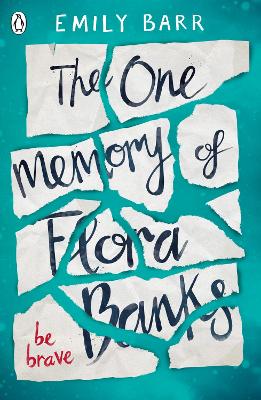Reviewed by pamela on
Flora Banks is a teenager who has anterograde amnesia. A tumour when she was ten made it impossible for her to create new memories and so she lives her life in a state of confusion, with the memories of a ten-year-old, but the body and emotions of a teenager. One night, she kisses a boy on the beach and for the first time she has a memory that stays. What follows is the story of her trying to hang on to that memory, a story that will twist and turn and take her on an adventure to the other side of the world.
Flora is an incredibly memorable character. As the narrator, her quirks and mannerisms show themselves in interesting ways. A lot of the narrative is repetitive for that reason, because we are experiencing the way that Flora’s mind works, but the repetition had just enough difference as to keep it interesting. I found the way it was written fascinating rather than boring. Flora writes things down (think Memento) to remind herself of them, and builds a physical trail of memories for her future self to follow.
The other characters in the book have no real characterisations of their own. Instead we experience them through Flora’s eyes, and for obvious reasons she proves herself a rather unreliable narrator. What is true of the people that she knows in one chapter can be completely turned on its head the next. We see Flora’s parents how she sees them at certain times in the narrative, and the same goes for the boy she kissed and her best friend. It made for very interesting reading and stylistically I simply can’t fault this book.
The big problem with this book, and indeed with so many books dealing with any kind of chronic illness, is that it doesn’t always deal with said illness in the best possible way. Despite the characters of the novel responding to her positively and appreciating her for everything that she is, Flora herself latches on to the one thing she feels she needs to be; normal. It is this idea of normalcy that makes this novel so problematic, especially when we factor in the layers of self-deception practiced by her family, and by herself on more than on occasion. It is this self-deception that needed to be tackled to give this book the depth that it needed. For me, one of the most tragic and underdeveloped characters of the whole novel is Flora’s mother. At times she is painted as a villain, but reading between the lines you can see a deeply troubled woman with her own mental illness to deal with who is given virtually no page time. The One Memory of Flora Banks had the potential to delve so deeply in to the subject of chronic illness, but instead it seemed to romanticise it and ultimately raised more problems than it solved.
I thoroughly enjoyed the experience of reading The One Memory of Flora Banks, even if I didn’t really love where it went. It was beautifully written, with a unique style and a memorable protagonist. With a bit more depth I think it could have been a great, and indeed important work of YA fiction, but it is not quite there yet.
Review also at I Blame Wizards
Reading updates
- Started reading
- 14 December, 2016: Finished reading
- 14 December, 2016: Reviewed
